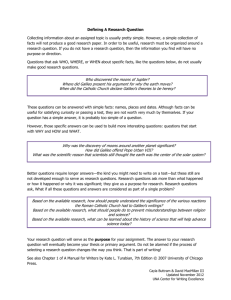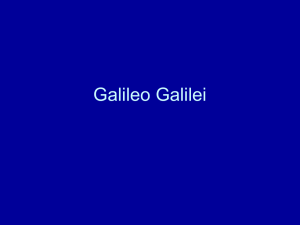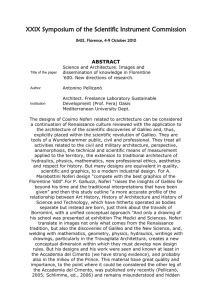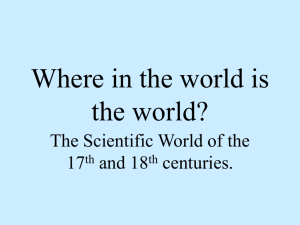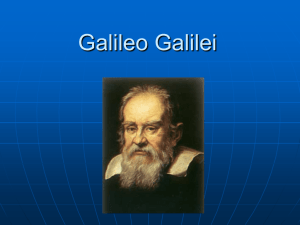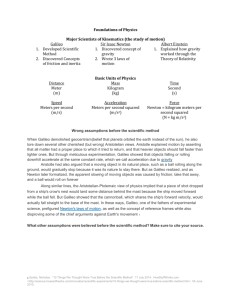x ~ t 2
advertisement
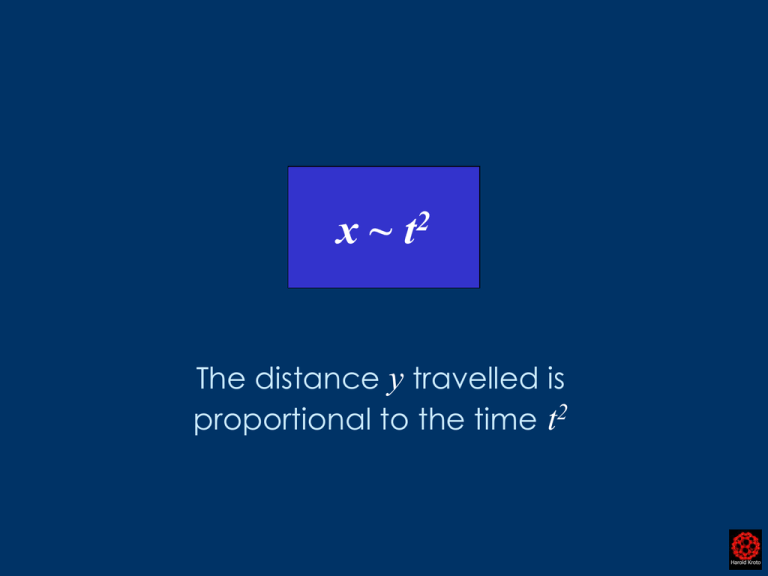
x ~ t2
The distance y travelled is
proportional to the time t2
Harold Kroto
http://singapore.cs.ucla.edu/LECTURE/section1/sld004.htm
Harold Kroto
http://galileo.rice.edu/lib/student_work/experiment95
/paraintr.html
-6
1
2
3
4
5
x
6
-4
-2
0
2
4
6
+t
x = at2
x ~ t2
Harold Kroto
x ~ t2
x = at2
Harold Kroto
x ~ t2
x = at2
dx/dt = v = 2at
Harold Kroto
x ~ t2
x = at2
dx/dt = v = 2at
½
v = 2a(x/a)
Harold Kroto
x ~ t2
x = at2
dx/dt = v = 2at
½
v = 2a(x/a)
½
½
v = 2a x
Harold Kroto
x ~ t2
x = at2
dx/dt = v = 2at
½
v = 2a(x/a)
½
½
v = 2a x
½
v~x
Harold Kroto
x ~ t2
x = at2
dx/dt = v = 2at
½
v = 2a(x/a)
½
½
v = 2a x
½
v~x
The velocity is proportional to
the square root of the distance travelled
Harold Kroto
v ~ x½
Harold Kroto
Harold Kroto
Galileo derived the correct kinematical law for the
distance travelled during a uniform acceleration
starting from rest—namely, that it is proportional to
the square of the elapsed time d ∝ t 2 .
Galileo derived the correct kinematical law for the
distance travelled during a uniform acceleration
starting from rest—namely, that it is proportional to
the square of the elapsed time d ∝ t 2 .
However, in neither case were these discoveries
entirely original. The time-squared law for uniformly
accelerated change was already known to Nicole
Oresme in the 14th century.
Galileo derived the correct kinematical law for the
distance travelled during a uniform acceleration
starting from rest—namely, that it is proportional to
the square of the elapsed time d ∝ t 2 .
However, in neither case were these discoveries
entirely original. The time-squared law for uniformly
accelerated change was already known to Nicole
Oresme in the 14th century.
Galileo expressed the time-squared law using
geometrical constructions and mathematically
precise words, adhering to the standards of the
day.
Galileo derived the correct kinematical law for the
distance travelled during a uniform acceleration
starting from rest—namely, that it is proportional to
the square of the elapsed time d ∝ t 2 .
However, in neither case were these discoveries
entirely original. The time-squared law for uniformly
accelerated change was already known to Nicole
Oresme in the 14th century.
Galileo expressed the time-squared law using
geometrical constructions and mathematically
precise words, adhering to the standards of the
day.
It remained for others to re-express the law in
algebraic terms.
Scientists are different from all others
We learn that we must not accept
anything without evidence
Question everything
Assess ALL claims without exception on
the basis of EVIDENCE
It is taking millennia to overcome power
based on the unauthenticated
claims of dogma-based authority
In 1992 after 13 years deliberation and 359 years
late the Vatican decided that Galileo was
correct, that the Earth did actually circle the
Sun and the Bible was wrong
It is interesting to
consider how long
it will take for
other claims to be
recognised as not
correct!
The GUARDIAN
The GUARDIAN
We learn that we must be careful –
very careful
We learn that we must be careful –
very careful
Question everything
De Revolutionibus, Copernicus www.hps.cam.ac.uk
We learn that we must be careful –
very careful
Question everything
It may take centuries to dispel false
beliefs
in this case till 1992
Vatican Finds Galileo `Not Guilty‘
The Pope Admits Error 359 years ago in
condemning Galileo for formulating scientific
theories it considered heresy.
November 1, 1992
Vatican Finds Galileo `Not Guilty';
Pope Admits Error In Rejecting Theory
November 1, 1992
It's official: The Earth revolves around the sun,
even for the Vatican. The Roman Catholic
Church has admitted to erring these past 359
years in formally condemning Galileo Galilei for
formulating scientific theories it considered
heresy.
SUN
EARTH
Aristotle’s Universe
Common Sense
Vatican admits Galileo was right
07 November 1992
In 1633, the Inquisition of the Roman
Catholic Church forced Galileo Galilei, one
of the founders of modern science, to recant
his theory that the Earth moves around the
Sun. Under threat of torture, Galileo
recanted. But as he left the courtroom, he is
said to have muttered, 'all the same, it
moves'.
Last week, 359 years later, the Church
finally agreed. At a ceremony in Rome,
before the Pontifical Academy of Sciences,
Pope John Paul II officially declared that
Galileo was right.
Vatican Finds Galileo `Not Guilty'; Pope Admits Error In Rejecting
Theory
The Washington Post | November 1, 1992| William D. Montalbano |
Copyright
Ads by Google
Regina Catholic Tours
Religious Tours & Pilgrimages Fatima, Lourdes, Italy & much more
www.Regina-Tours.com
Studies in Emergent Order
Academic articles, reviews open source
studiesinemergentorder.com
Purgatory & How the
Teachings of Purgatory are Found in the Bible
www.mostholyfamilymonastery.com
It's official: The Earth revolves around the sun, even for the Vatican.
The Roman Catholic Church has admitted to erring these past 359
years in formally condemning Galileo Galilei for formulating scientific
theories it considered heresy.
Pope John Paul II himself attended a meeting today of the Pontifical
Academy of Sciences to help set the record straight on behalf of the
17th-century Italian mathematician, astronomer and physicist who was
Vatican Finds Galileo `Not Guilty'; Pope Admits Error In Rejecting
Theory
November 1, 1992
It's official: The Earth revolves around the sun, even for the Vatican.
The Roman Catholic Church has admitted to erring these past 359
years in formally condemning Galileo Galilei for formulating scientific
theories it considered heresy.
Pope John Paul II himself attended a meeting today of the Pontifical
Academy of Sciences to help set the record straight on behalf of the
17th-century Italian mathematician, astronomer and physicist who was
the first man to use a telescope and who is remembered as one of
history's greatest scientists.
"The underlying problems of this case concern both the ...
Vatican admits Galileo was right
07 November 1992
Magazine issue 1846. Subscribe and get 4 free issues.
For similar stories, visit the Cosmology Topic Guide
In 1633, the Inquisition of the Roman Catholic Church forced Galileo
Galilei, one of the founders of modern science, to recant his theory
that the Earth moves around the Sun. Under threat of torture, Galileo
- seen (right) facing his inquisitors - recanted. But as he left the
courtroom, he is said to have muttered, 'all the same, it moves'.
Last week, 359 years later, the Church finally agreed. At a ceremony
in Rome, before the Pontifical Academy of Sciences, Pope John Paul
II officially declared that Galileo was right. The formal rehabilitation
was based on the findings of a committee of the Academy the Pope
set up in 1979, soon after taking office. The committee decided the
Inquisition had acted in good faith, but was wrong.
In fact, the Inquisition's verdict was uncannily similar to cautious
statements by modern officialdom on more recent scientific
conclusions, such as predictions about greenhouse warming. The
Inquisition ruled that Galileo could not prove 'beyond doubt' that the
Earth orbits the Sun, so they could not reinterpret scriptures implying
otherwise.
Vatican admits Galileo was right
07 November 1992
Magazine issue 1846. Subscribe and get 4 free issues.
For similar stories, visit the Cosmology Topic Guide
In 1633, the Inquisition of the Roman Catholic Church forced Galileo
Galilei, one of the founders of modern science, to recant his theory
that the Earth moves around the Sun. Under threat of torture, Galileo
- seen (right) facing his inquisitors - recanted. But as he left the
courtroom, he is said to have muttered, 'all the same, it moves'.
Last week, 359 years later, the Church finally agreed. At a ceremony
in Rome, before the Pontifical Academy of Sciences, Pope John Paul
II officially declared that Galileo was right. The formal rehabilitation
was based on the findings of a committee of the Academy the Pope
set up in 1979, soon after taking office. The committee decided the
Inquisition had acted in good faith, but was wrong.
In fact, the Inquisition's verdict was uncannily similar to cautious
statements by modern officialdom on more recent scientific
conclusions, such as predictions about greenhouse warming. The
Inquisition ruled that Galileo could not prove 'beyond doubt' that the
Earth orbits the Sun, so they could not reinterpret scriptures implying
otherwise.
The verdict was not one to which the doctrine of papal infallibility
applied, and the Vatican was never comfortable with it. Pope Urban
approved it, but commuted Galileo's sentence from prison to house
SUN
EARTH
Aristotle’s Universe
Common Sense
SUN
EARTH
Aristotle’s Universe
Common Sense
3
Senses
EARTH
----------------
●
Aristotle’s Universe
Common Sense
Galileo proposed that a falling body would fall with a uniform
acceleration, as long as the resistance of the medium through
which it was falling remained negligible, or in the limiting case
of its falling through a vacuum.[125] He also derived the correct
kinematical law for the distance travelled during a uniform
acceleration starting from rest—namely, that it is proportional to
the square of the elapsed time ( d ∝ t 2 ).[126] However, in
neither case were these discoveries entirely original. The timesquared law for uniformly accelerated change was already
known to Nicole Oresme in the 14th century,[127] and Domingo
de Soto, in the 16th, had suggested that bodies falling through
a homogeneous medium would be uniformly accelerated.[128]
Galileo expressed the time-squared law using geometrical
constructions and mathematically precise words, adhering to
the standards of the day. (It remained for others to re-express
the law in algebraic terms).
He also concluded that objects retain their velocity unless a
force—often friction—acts upon them, refuting the generally
accepted Aristotelian hypothesis that objects "naturally" slow
down and stop unless a force acts upon them (philosophical
ideas relating to inertia had been proposed by John Philoponus
centuries earlier, as had Jean Buridan, and according to
Joseph Needham, Mo Tzu had proposed it centuries before
either of them, but this was the first time that it had been
mathematically expressed, verified experimentally, and
introduced the idea of frictional force, the key breakthrough in
validating inertia). Galileo's Principle of Inertia stated: "A body
moving on a level surface will continue in the same direction at
constant speed unless disturbed." This principle was
incorporated into Newton's laws of motion (first law).
Harold Kroto
The motion of Venus www.splung.com
Harold Kroto
Harold Kroto
Harold Kroto
If the geocentric model were
correct it would be impossible to
observe the full disk of Venus
with the sun in this position
Harold Kroto
Harold Kroto
http://www.exo.net/~pauld/workshops/Galileoscope/Galileo.html
Harold Kroto
Geocentric epicycle explanation
http://csep10.phys.utk.edu/astr161/lect/retrograde/aristotle.html
Harold Kroto
Harold Kroto
Here Galileo discusses the Ptolemaic and Copernican
Solar Systems.
Harold Kroto
In the end the Inquisition, ordered Galileo not
to "hold or defend" his this claim
Harold Kroto
The telescope magnifies
only 14 times and gives
a very restricted field of
view.
Galileo published
'Sidereus Nuncius' ('The
Starry Messenger') in
1610
craters on the Moon,
the phases of Venus
and the moons of
Jupiter.
www.sciencemuseum.o
rg.uk
Harold Kroto
Harold Kroto
Harold Kroto
In the end, Cardinal Bellarmine, acting on
directives from the Inquisition, delivered
him an order not to "hold or defend" the
idea that the Earth moves and the Sun
stands still at the centre.
By 1616 the attacks on Galileo had
reached a head, and he tried to
persuade the Church not to ban his
conclusions that the Earth rotates
around the Sun
In the end Evidence was the final
arbiter and the separation of Science
from both Philosophy and Religion took
place.
Galileo’s case was the turning point
and a major justification for his
description as
“The Father of Science".
By 1616 the attacks on Galileo had
reached a head, and he went to Rome
to try to persuade the Church
authorities not to ban his ideas.
Although he tried to remain loyal to the
Catholic Church, Galileo's adherence
to experimental results, and their most
honest
interpretation,
clearly
contributed to the rejection of blind
allegiance
to
authority,
both
philosophical and religious, in matters
of science.
History
http://en.wikipedia.org/wiki/File:Phases-of-Venus.svg
Diagram of the orbit of Venus in relationship to the Earth.
The first known observations of the full planetary phases of Venus were by
Galileo at the end of 1610 (though not published until 1613). Using a
telescope, Galileo was able to observe Venus going through a full set of
phases, something prohibited by the Ptolemaic system (which would never
allow Venus to be fully lit from the perspective of the Earth or more than
semi-circular). This observation essentially ruled out the Ptolemaic system,
and was compatible only with the Copernican system and the Tychonic
system and other geoheliocentric models such as the Capellan and Riccioli's
extended Capellan model.
Harold Kroto
http://www.vikdhillon.staff.shef.ac.uk/teaching/phy105/celsphere/phy
105_ptolemy.html
http://singapore.cs.ucla.edu/LECTURE/section1/sld004.htm
Galileo
GALILEAN EQUATION
d ~ t2
It is hard for us to appreciate today how
strange that idea sounded in 1638, barely 50
years after the introduction of algebraic
notation by Vieta. To proclaim algebra the
UNIVERSAL language of science, would
sound today like proclaiming Esperanto the
language of economics. Why would Nature
agree to speak Algebra? of all languages?
But you can't argue with success. The
distance traveled by an object turned out
indeed to be proportional to the square of the
time.
http://singapore.cs.ucla.edu/LECTURE/section1/sld004.htm
pds.jpl.nasa.gov
www.rpi.edu
Heliocentrism Evidence
He took Augustine's position on the
Scriptures:
Not to take every passage literally!
http://singapore.cs.ucla.edu/LECTURE/section1/sld004.htm
A Just Condemnation Recognized by Many
Galileo at the process of the Inquistition
Prof. Nicola Cabibbo, ex-president of the Italian Institute of Nuclear
Physics summarized the case: “Galileo was not condemned for his
scientific theses, but because he wanted to formulate theology” (19).
Therefore, there is no reason to say that the Inquisition and the Church
erred when they condemned Galileo. There is even less reason to say
that such condemnation demonstrates the Church is not infallible. Also,
the hasty consequence that the door should open to a scientific
interpretation of Scripture is not conclusive.
Science lacks the competence to interpret Sacred Scripture; if it were
otherwise, we would end by denying all the revealed mysteries, which
are far beyond the capacity of physical and experimental sciences to
explain. To introduce scientific criticism in questions of Faith would be to
reduce them to human stature, which is the same as denying them. 17.
Joseph Ratzinger, Corriere della Sera, March 30, 1990; 30 Dias,
January 1993, p. 34.
18. Vittorio Messori, Avvenire, October 19, 1989.
19. Nicola Cabibbo, 30 Dias, January 1993, p. 33.
A Just Condemnation Recognized by Many
The Holy Inquisition, therefore, acted correctly in condemning Galileo.
That action was consistent with its mission of guarding the integrity of
the Catholic Faith. It was justly defending the Catholic Theology and
Philosophy attacked by Galileo Galilei.
In a speech delivered in Parma, Italy, March 15, 1990, even Cardinal
Joseph Ratzinger endorsed the opinion of philosopher P. Feyerabend
against Galileo. Ratzinger stated: “At the time of Galileo the Church
remained much more faithful to reason than Galileo himself. The
process against Galileo was reasonable and just” (17). Italian author and
journalist Vittorio Messori was also critical of Galileo: “Galileo was not
condemned for the things he said, but for the way he said them. He
made statements with a sectarian intolerance, like a ‘missionary’ of a
new gospel …. Since he did not have objective evidence for what he
said, the things he said in his private letters to those men [of the Roman
College] made him suspect of dogmatism supporting the new religion of
science. One who would not immediately accept the entire Copernican
system was ‘an imbecile with his head in the clouds,’ ‘a stain upon
mankind,’ ‘a child who never grew up,’ and so on. At depth the certainty
of being infallible seemed to belong more to him than to the religious
authority” (18).
Galileo at the process of the Inquistition
The idea that the Church had acted “more rationally” in its dealings with
Galileo was given its most detailed defence by Feyerabend in his talk to the
Crakow Conference of 24-27 May 1984, entitled Galileo and the Tyranny of
Truth (reprinted in Farewell to Reason). A severe treatment of Poupard’s
(non-)resolution can be found in Annibale Fantoli’s work, particularly his
Galileo and the Catholic Church: A Critique of the “Closure” of the Galileo
Commission’s Work (Specola Vaticana, 2002). I myself have discussed why
Feyerabend’s argument fails here (with more detail here), but the basic
point is that the interpretive principle arrived at by Bellarmine in his Letter to
Foscarini rendered any thought of development in the Church’s attitude
towards heliocentrism or geokineticism impossible due to his insistence that
the Bible passages ostensibly contradicting either were to be considered a
matter of faith ex parte dicentis. Feyerabend appears to have been
unaware of this, given that he remarked that Ratzinger’s position was
“similar” to Bellarmine’s when instead only the instrumentalism of the early
parts of Bellarmine’s letter are supported by his caution, not the later
declaration that all Scriptural passages are authored by the Holy Spirit (with
its consequences). Both Feyerabend and Ratzinger were mistaken on
this issue, then, since calling this approach - leading invariably to
stagnation in astronomy and physics, as Galileo and senior Jesuits
like Grienberger foresaw - more rational than Galileo’s is absurd. Like
most others who have come into contact with the Galileo Affair, they have
simplified the events to fit their own preconceptions.
The Pope, the ex-Grand Inquisitor
Lest you think that our new Pope is not the sort to burn people at the stake, in
1997 Ratzinger said that Buddhism is ‘autoerotic spirituality’ that offers
‘transcendence without imposing concrete religious obligations’. 'Hinduism,' he
added, offers ‘false hope’; it guarantees ‘purification’ based on a ‘morally cruel’
concept of reincarnation resembling ‘a continuous circle of hell’. The Cardinal
predicted Buddhism would replace Marxism as the Catholic Church’s main
enemy this century. Barbequed Buddhists anyone?
Pope Ratzinger believes that only the Catholic Chutch is a true church. That
make all other Christian denominations fake churches, in Ratzinger's eyes,
and Ratzinger believes that as Pope, his eyes are the same as the eyes of
God. Posted 4/22/2005 8:26 AM - email it
Psalms
93:1;
96:10;
104:5,
1Chronicles 16:30 and Ecclesiastes
1:4,5 speak of the (in some sense)
"firm" and "established" position of the
earth. Galileo defended heliocentrism,
and claimed it was not contrary to
those Scripture passages.
The writers of the Scripture wrote
from the perspective of the
terrestrial world, and from that
vantage point the sun does rise
and set. In fact, it is the earth's
rotation
which
gives
the
impression of the sun in motion
across the sky.
The decree did not prevent Galileo
from
discussing
heliocentrism
hypothetically. For the next several
years Galileo stayed well away from
the controversy.
Date: 1632
Made In: Florence
In this book Galileo compared the Earth-centred Ptolemaic and
Sun-centred Copernican systems. He wrote in Italian, rather than
the Latin of scholars, to reach a wider audience.
Galileo clearly favoured the Copernican system, but he misjudged
the reception the book would receive from the Catholic Church. He
was tried for heresy, forced to recant his ideas, and ended his life
under house imprisonment.
He took Augustine's position on
Scripture: not to take every passage
literally, particularly when the scripture
in question is a book of poetry and
songs, not a book of instructions or
history.
This lead to the separation of Science
from both Philosophy and Religion,
a major justification for his description
as “The Father of Science".
A Just Condemnation Recognized by Many
Galileo at the process of the Inquistition
Prof. Nicola Cabibbo, ex-president of the
Italian Institute of Nuclear Physics
summarized the case: “Galileo was not
condemned for his scientific theses, but
because he wanted to formulate theology”
(19).
Therefore, there is no reason to say that the
Inquisition and the Church erred when they
condemned Galileo. There is even less reason
to say that such condemnation demonstrates
the Church is not infallible. Also, the hasty
consequence that the door should open to a
scientific interpretation of Scripture is not
conclusive.
Science lacks the competence to interpret
Sacred Scripture; if it were otherwise, we
would end by denying all the revealed
mysteries, which are far beyond the capacity
of physical and experimental sciences to
explain. To introduce scientific criticism in
questions of Faith would be to reduce them to
human stature, which is the same as denying
them. 17. Joseph Ratzinger, Corriere della
Sera, March 30, 1990; 30 Dias, January 1993,
p. 34.
18. Vittorio Messori, Avvenire, October 19,
1989.
19. Nicola Cabibbo, 30 Dias, January 1993, p.
33.
The Pope, the ex-Grand Inquisitor
In a speech delivered in Parma, Italy, March 15, 1990, the then Cardinal
Joseph Ratzinger, now Pope Benedict XIV endorsed the Catholic Church's
persecution of the great astronomer Galileo. Ratzinger stated:
“At the time of Galileo the Church remained much more faithful to reason than
Galileo himself. The process against Galileo was reasonable and just.”
Ratzinger wss under the last pope, prefect of the Congregation for the
Doctrine of the Faith, the official organization that was known prior to 1908 as
the Sacred Congregation for the Universal Inquisition. That's right folks,
Ratzinger was prior to becoming Pope, the Grand Inquisitor.
The Sacred Congregation of the Universal Inquisition was founded in 1542 by
Pope Paul III, its duties originally included tourturing people and burning
people at the stake. The Pope had thus been the titular head of the
organization that had persecuted Gslileo. Ratzinger was still fighting the good
fight in 1990. Of course the Church was right to persceute Galileo for saying
the earth circled the sun. Galileo was irrational, even though we are now
foced to admit that those Catholic Churchmen who refused to look throuugh
Galileo's telescope and pronunced him a heritic did make a mistake.
In the end, Cardinal Bellarmine, acting on
directives from the Inquisition, ordered
Galileo not to "hold or defend" his claim that
the Earth moves round the Sun.
Science lacks the competence to interpret
Sacred Scripture; if it were otherwise, we
would end by denying all the revealed
mysteries, which are far beyond the capacity
of physical and experimental sciences to
explain. To introduce scientific criticism in
questions of Faith would be to reduce them to
human stature, which is the same as denying
them.
17. Joseph Ratzinger, Corriere della Sera, March 30,
1990; 30 Dias, January 1993, p. 34.
18. Vittorio Messori, Avvenire, October 19, 1989.19.
Nicola Cabibbo, 30 Dias, January 1993, p. 33.
He took Augustine's position on
Scripture: not to take every passage
literally, particularly when the scripture
in question is a book of poetry and
songs, not a book of instructions or
history.
A Just Condemnation Recognized by Many
Galileo at the process of the Inquistition
Prof. Nicola Cabibbo, ex-president of the
Italian Institute of Nuclear Physics
summarized the case: “Galileo was not
condemned for his scientific theses, but
because he wanted to formulate theology”
(19).
Therefore, there is no reason to say that the
Inquisition and the Church erred when they
condemned Galileo. There is even less reason
to say that such condemnation demonstrates
the Church is not infallible. Also, the hasty
consequence that the door should open to a
scientific interpretation of Scripture is not
conclusive.
The Pope, the ex-Grand Inquisitor
In a speech delivered in Parma, Italy, March 15, 1990, the then Cardinal
Joseph Ratzinger, now Pope Benedict XIV endorsed the Catholic Church's
persecution of the great astronomer Galileo. Ratzinger stated:
“At the time of Galileo the Church remained much more faithful to reason than
Galileo himself. The process against Galileo was reasonable and just.”
Ratzinger wss under the last pope, prefect of the Congregation for the
Doctrine of the Faith, the official organization that was known prior to 1908 as
the Sacred Congregation for the Universal Inquisition. That's right folks,
Ratzinger was prior to becoming Pope, the Grand Inquisitor.
The Sacred Congregation of the Universal Inquisition was founded in 1542 by
Pope Paul III, its duties originally included tourturing people and burning
people at the stake. The Pope had thus been the titular head of the
organization that had persecuted Gslileo. Ratzinger was still fighting the good
fight in 1990. Of course the Church was right to persceute Galileo for saying
the earth circled the sun. Galileo was irrational, even though we are now
foced to admit that those Catholic Churchmen who refused to look throuugh
Galileo's telescope and pronunced him a heritic did make a mistake.
A Just Condemnation Recognized by Many
Galileo at the process of the Inquistition
Prof. Nicola Cabibbo, ex-president of the Italian Institute of Nuclear
Physics summarized the case: “Galileo was not condemned for his
scientific theses, but because he wanted to formulate theology” (19).
Therefore, there is no reason to say that the Inquisition and the Church
erred when they condemned Galileo. There is even less reason to say
that such condemnation demonstrates the Church is not infallible. Also,
the hasty consequence that the door should open to a scientific
interpretation of Scripture is not conclusive.
Science lacks the competence to interpret Sacred Scripture; if it were
otherwise, we would end by denying all the revealed mysteries, which
are far beyond the capacity of physical and experimental sciences to
explain. To introduce scientific criticism in questions of Faith would be to
reduce them to human stature, which is the same as denying them. 17.
Joseph Ratzinger, Corriere della Sera, March 30, 1990; 30 Dias,
January 1993, p. 34.
18. Vittorio Messori, Avvenire, October 19, 1989.
19. Nicola Cabibbo, 30 Dias, January 1993, p. 33.
He took Augustine's position on the
Scriptures:
Not to take every passage literally!
A Just Condemnation Recognized by Many
The Holy Inquisition, therefore, acted correctly in condemning Galileo.
That action was consistent with its mission of guarding the integrity of
the Catholic Faith. It was justly defending the Catholic Theology and
Philosophy attacked by Galileo Galilei.
In a speech delivered in Parma, Italy, March 15, 1990, even Cardinal
Joseph Ratzinger endorsed the opinion of philosopher P. Feyerabend
against Galileo. Ratzinger stated: “At the time of Galileo the Church
remained much more faithful to reason than Galileo himself. The
process against Galileo was reasonable and just” (17). Italian author and
journalist Vittorio Messori was also critical of Galileo: “Galileo was not
condemned for the things he said, but for the way he said them. He
made statements with a sectarian intolerance, like a ‘missionary’ of a
new gospel …. Since he did not have objective evidence for what he
said, the things he said in his private letters to those men [of the Roman
College] made him suspect of dogmatism supporting the new religion of
science. One who would not immediately accept the entire Copernican
system was ‘an imbecile with his head in the clouds,’ ‘a stain upon
mankind,’ ‘a child who never grew up,’ and so on. At depth the certainty
of being infallible seemed to belong more to him than to the religious
authority” (18).
Galileo at the process of the Inquistition
The idea that the Church had acted “more rationally” in its dealings with
Galileo was given its most detailed defence by Feyerabend in his talk to the
Crakow Conference of 24-27 May 1984, entitled Galileo and the Tyranny of
Truth (reprinted in Farewell to Reason). A severe treatment of Poupard’s
(non-)resolution can be found in Annibale Fantoli’s work, particularly his
Galileo and the Catholic Church: A Critique of the “Closure” of the Galileo
Commission’s Work (Specola Vaticana, 2002). I myself have discussed why
Feyerabend’s argument fails here (with more detail here), but the basic
point is that the interpretive principle arrived at by Bellarmine in his Letter to
Foscarini rendered any thought of development in the Church’s attitude
towards heliocentrism or geokineticism impossible due to his insistence that
the Bible passages ostensibly contradicting either were to be considered a
matter of faith ex parte dicentis. Feyerabend appears to have been
unaware of this, given that he remarked that Ratzinger’s position was
“similar” to Bellarmine’s when instead only the instrumentalism of the early
parts of Bellarmine’s letter are supported by his caution, not the later
declaration that all Scriptural passages are authored by the Holy Spirit (with
its consequences). Both Feyerabend and Ratzinger were mistaken on
this issue, then, since calling this approach - leading invariably to
stagnation in astronomy and physics, as Galileo and senior Jesuits
like Grienberger foresaw - more rational than Galileo’s is absurd. Like
most others who have come into contact with the Galileo Affair, they have
simplified the events to fit their own preconceptions.
The Pope, the ex-Grand Inquisitor
Lest you think that our new Pope is not the sort to burn people at the stake, in
1997 Ratzinger said that Buddhism is ‘autoerotic spirituality’ that offers
‘transcendence without imposing concrete religious obligations’. 'Hinduism,' he
added, offers ‘false hope’; it guarantees ‘purification’ based on a ‘morally cruel’
concept of reincarnation resembling ‘a continuous circle of hell’. The Cardinal
predicted Buddhism would replace Marxism as the Catholic Church’s main
enemy this century. Barbequed Buddhists anyone?
Pope Ratzinger believes that only the Catholic Chutch is a true church. That
make all other Christian denominations fake churches, in Ratzinger's eyes,
and Ratzinger believes that as Pope, his eyes are the same as the eyes of
God. Posted 4/22/2005 8:26 AM - email it
Although he tried to remain loyal to the
Catholic Church, Galileo's adherence
to experimental results, and their most
honest
interpretation,
clearly
contributed to the rejection of blind
allegiance
to
authority,
both
philosophical and religious, in matters
of science.
Psalms
93:1;
96:10;
104:5,
1Chronicles 16:30 and Ecclesiastes
1:4,5 speak of the (in some sense)
"firm" and "established" position of the
earth. Galileo defended heliocentrism,
and claimed it was not contrary to
those Scripture passages.
The writers of the Scripture wrote
from the perspective of the
terrestrial world, and from that
vantage point the sun does rise
and set. In fact, it is the earth's
rotation
which
gives
the
impression of the sun in motion
across the sky.
The decree did not prevent Galileo
from
discussing
heliocentrism
hypothetically. For the next several
years Galileo stayed well away from
the controversy.
